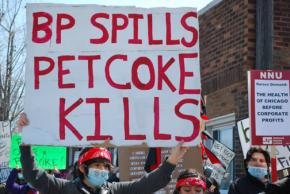Taking a stand on Earth Day
SW reports on two actions in Chicago and New York as people in dozens of cities on Earth Day to take a stand for climate justice.
ON THIS year's Earth Day, activists in cities around the U.S. held events as the nationwide Global Climate Convergence got underway.
The convergence was conceived as 10 days of activism, from Earth Day (April 22) to May Day (May 1), to draw the connections between the destruction of the environment and the struggles of working people. By highlighting these links, the convergence represented an important step in pointing to a real solution to climate change--one that sees environmental activists and working people as allies in a common struggle for environmental and social justice.
In Chicago, close to 200 activists came out for the Earth Day March and Rally. Members of the Little Village Environmental Organization, Workers United, System Change Not Climate Change and the Southeast Side Coalition to Ban Petcoke, among others, had contingents present.
The demonstration began at the State of Illinois building--a symbolic choice given that recent Illinois legislation has allowed for an increase in fracking and crude oil pipeline expansion possibilities. Additionally, the state has continued to refuse to clean up pollution in our neighborhoods.

The rally at the Thompson Center included performances from local musicians, and featured a speech by a member of the Boycott SodaStream Campaign. A self-described "green" company, SodaStream operates within the colonialist project of Israel, on occupied Palestinian land. Companies in occupied territories are often responsible for a lack of municipal resources such as clean water being available to Palestinians in the settlements, including where SodaStream is produced.
The march began, with stops at the offices of what were deemed to be some of the biggest climate criminals, beginning with Boeing. Speakers connected the role that Boeing plays in the military industrial complex, and how unilateral bombings by the U.S. military lead to environmental catastrophe. Speakers reminded the crowd that military suppliers are some of the most harmful companies to the environment. Simply put, the war machine isn't "green."
The march continued to the offices of BP, the company responsible for the massive deep water spill in the Gulf of Mexico, one of the largest environmental catastrophes ever. The company recently leaked up to 600 gallons of oil onto Lake Michigan, a source of drinking water for 7 million people.
The march then headed to Chase Bank in order to call out the role that banks play in funding some of the worst polluters, including pipelines planned by oil companies such as Enbridge and TransCanada. Connections were also made with the role banks have played in evictions, and how those affect the poor and people of color at alarming rates, the same way that the attacks on our environment tend to as well.
Some of the more popular chants included "No coal, no oil. Keep your carbons in the soil," and "Drinking water for the masses, not just for the ruling class.
In New York City, a small disruption took place at Union Square Park a little after 11 a.m. on April 22. Recently elected Mayor Bill de Blasio had just concluded addressing a crowd of about 300 onlookers at Earth Day-NY. On stage, a band was tuning their instruments, about to begin a set of children's music, when the words "mic check" rose from the crowd.
"Mic check!" came the response.
A small flock of muckrakers were unhappy with the event--whose corporate sponsors included Toyota, Enterprise Car Rental and United Airlines. The news cameras that had just finished following the mayor off stage quickly whipped around to film a group of 10 activists standing in front of a banner that read "Reclaim Earth Day; corporations can't solve the crisis, corporations are the crisis."
Like the rabble-rousers, hundreds of pedestrians who had assembled that morning must have felt something was lacking in the ceremonies as well, since they joined in the "people's mic," repeating the impromptu speaker's call for fewer planes in the sky and cars on the road. "It's time to reclaim Earth Day from corporate greenwashers," said the speaker, to a round of applause.
In the spirit of filling this popular void of dissent in an era where our planet faces ruination at great profit to a few, approximately 200 people gathered near Wall Street at Zuccotti Park later that day. Instead of placards, many carried plants in their arms--clear enough for the bankers in New York's Financial District to get the message: This is our earth, and we won't let you kill it.
Rising from the throng of eco-warriors as they prepared to flood the narrow streets that spiderweb along the heavily-policed terrain surrounding the Stock Exchange rose a traditional May Pole. The Peoples Puppets of Occupy Wall Street provided the prop and, in the spirit of connecting Earth Day to May Day and the rights of Mother Earth to workers' rights, had strung a variety of demands from the pole's crown--signifying that all our grievances are connected.
After occupying the steps at Federal Hall, across the street from the Exchange, and calling for Wall Street to divest from fossil fuels, the crowd paid a visit to a nearby TD Bank branch.
"TD Bank, go to hell me don't need no KXL," they chatted, shutting down business at the bank that is the number one financier of the Keystone XL pipeline and of tar sands oil extraction in Alberta.
The total budget of the protest was $53.29, which went towards covering the cost of constructing the May Pole and other props. There were no corporate sponsors.


